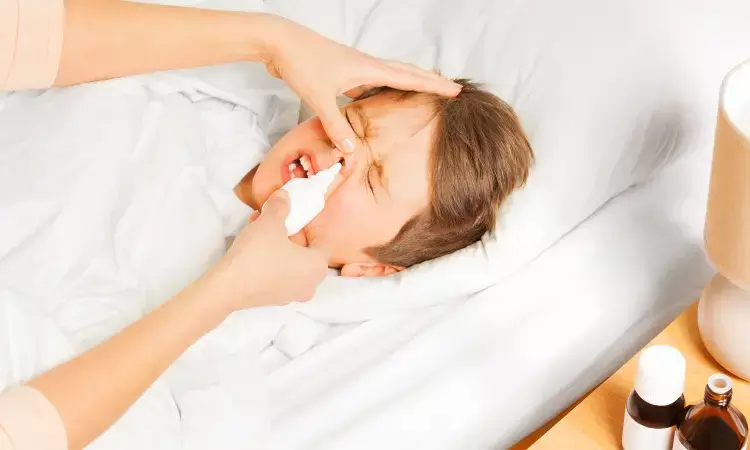- Home
- Medical news & Guidelines
- Anesthesiology
- Cardiology and CTVS
- Critical Care
- Dentistry
- Dermatology
- Diabetes and Endocrinology
- ENT
- Gastroenterology
- Medicine
- Nephrology
- Neurology
- Obstretics-Gynaecology
- Oncology
- Ophthalmology
- Orthopaedics
- Pediatrics-Neonatology
- Psychiatry
- Pulmonology
- Radiology
- Surgery
- Urology
- Laboratory Medicine
- Diet
- Nursing
- Paramedical
- Physiotherapy
- Health news
- Fact Check
- Bone Health Fact Check
- Brain Health Fact Check
- Cancer Related Fact Check
- Child Care Fact Check
- Dental and oral health fact check
- Diabetes and metabolic health fact check
- Diet and Nutrition Fact Check
- Eye and ENT Care Fact Check
- Fitness fact check
- Gut health fact check
- Heart health fact check
- Kidney health fact check
- Medical education fact check
- Men's health fact check
- Respiratory fact check
- Skin and hair care fact check
- Vaccine and Immunization fact check
- Women's health fact check
- AYUSH
- State News
- Andaman and Nicobar Islands
- Andhra Pradesh
- Arunachal Pradesh
- Assam
- Bihar
- Chandigarh
- Chattisgarh
- Dadra and Nagar Haveli
- Daman and Diu
- Delhi
- Goa
- Gujarat
- Haryana
- Himachal Pradesh
- Jammu & Kashmir
- Jharkhand
- Karnataka
- Kerala
- Ladakh
- Lakshadweep
- Madhya Pradesh
- Maharashtra
- Manipur
- Meghalaya
- Mizoram
- Nagaland
- Odisha
- Puducherry
- Punjab
- Rajasthan
- Sikkim
- Tamil Nadu
- Telangana
- Tripura
- Uttar Pradesh
- Uttrakhand
- West Bengal
- Medical Education
- Industry
Repeat dose of diazepam nasal spray within 4 hours of first dose may prevent status epilepticus: Study

USA: The findings of a new study published in the Epilepsia journal show that the safety and pharmacokinetic characteristics of the second dosage of diazepam nasal spray given within 4 hours of the first dosage are consistent with those associated with existing labeling.
The current labeling for diazepam nasal spray advises a 4-hour delay before delivering a second dosage. As a result, Gregory D. Cascino and colleagues undertook this study to investigate the safety and pharmacokinetic characteristics of second doses of diazepam nasal spray administered 4 hours following the initial dosage.
For this study, two datasets were studied. The first was a long-term, repeat-dose safety trial of diazepam nasal spray that evaluated rates of treatment-emergent adverse events (TEAEs), significant TEAEs, and treatment-related TEAEs in patients who received a 1-second dosage 4 h after the first against all second doses >4 h after the first. The second study was a population pharmacokinetic analysis that used data from three phase 1 trial to predict drug exposure when a second dosage of diazepam nasal spray was delivered at varied time periods (1 minute 4 hours) after the first dose.
The key findings of this study were as follows:
1. A second dosage of diazepam nasal spray was delivered 24 hours after the first to treat 485 seizure clusters in 79 individuals in the repeat-dose safety trial.
2. TEAE rates were comparable for patients receiving 1 second dosage in 4 h (89.5%, n = 38) and >4–24 h alone (80.5%, n = 41).
3. The most prevalent treatment-related TEAEs were linked with mild to severe, transitory nose pain.
4. No cases of respiratory or cardiac depression were reported.
5. The pharmacokinetic models of second doses projected equivalent increases in plasma diazepam concentrations with doses at various intervals following the first dosage (1 min-4 h).
In conclusion, this study found no clinical evidence that a second dosage should be administered sooner than 4 hours following the first dose if there is a need to do so. Dosing intervals of 1 minute to 4 hours resulted in equivalent diazepam exposures as later doses and had no effect on safety. As a result, the second dose of diazepam nasal spray might be administered safely to treat seizure clusters if needed within 4 hours after the initial dose. This lends credence to the idea of giving second dosages based on individual need in order to prevent subsequent seizures that might result in physical harm, neurological injury, the need of emergency services, status epilepticus, and sudden unexplained death in epilepsy.
Reference:
Cascino, G. D., Tarquinio, D., Wheless, J. W., Hogan, R. E., Sperling, M. R., Desai, J., Vazquez, B., Samara, E., Misra, S. N., Carrazana, E., & Rabinowicz, A. L. (2022). Lack of clinically relevant differences in safety and pharmacokinetics after second‐dose administration of intranasal diazepam within 4 h for acute treatment of seizure clusters: A population analysis. In Epilepsia. Wiley. https://doi.org/10.1111/epi.17249
Medical Dialogues consists of a team of passionate medical/scientific writers, led by doctors and healthcare researchers. Our team efforts to bring you updated and timely news about the important happenings of the medical and healthcare sector. Our editorial team can be reached at editorial@medicaldialogues.in.
Dr Kamal Kant Kohli-MBBS, DTCD- a chest specialist with more than 30 years of practice and a flair for writing clinical articles, Dr Kamal Kant Kohli joined Medical Dialogues as a Chief Editor of Medical News. Besides writing articles, as an editor, he proofreads and verifies all the medical content published on Medical Dialogues including those coming from journals, studies,medical conferences,guidelines etc. Email: drkohli@medicaldialogues.in. Contact no. 011-43720751


